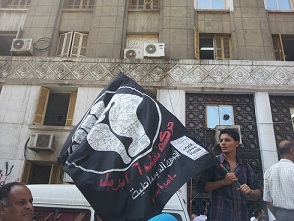
(AFP file/Odd Andersen)
AFP – A New York jury convicted British hate preacher Abu Hamza on 11 kidnapping and terrorism charges Monday, opening the way for a judge to impose what will almost certainly be a life sentence.
The hook-handed imam, who became a tabloid bogeyman in Britain after morphing into an anti-American preacher at the Finsbury Park mosque in north London, showed no reaction as the guilty verdict was returned on all counts following a four-week trial.
Judge Katherine Forrest will return to the Manhattan courtroom on 9 September to sentence Abu Hamza, 56, and wrap up what was the second high-profile terror trial in New York in three months.
Campaigners will seize on the trial as further proof that US terror cases could be tried more effectively in civilian courts as pressure builds to close the Guantanamo Bay prison camp.
In March, another New York jury found Osama bin Laden’s son-in-law and former Al-Qaeda spokesman, Suleiman Abu Ghaith, guilty in a lightning-quick trial a year after his arrest.
“With each efficiently delivered guilty verdict against a top Al-Qaeda-linked figure, the debate over how to best seek justice in these cases is quietly being put to rest,” said attorney general Eric Holder.
Manhattan’s top federal prosecutor, US attorney Preet Bharara, added: “These trials demonstrate that in an American civilian courtroom, the American people and all the victims of terrorism can be vindicated without sacrificing our principles.”
Mustafa Kamel Mustafa, better known in Britain as Abu Hamza Al-Masri, was charged with the 1998 abduction of Western tourists in Yemen, providing material support to Al-Qaeda, assisting the Taliban and sending terror recruits to Afghanistan.
Of the 16 tourists that were kidnapped, 4 were killed.
It took the 12-member jury just 12 hours over two days to reach the unanimous verdict.
One member of the jury, who did not want to disclose his identity, said they tried to follow the judge’s guidelines in reaching a verdict.
The Yemen counts were “easier” to decide, the juror said, describing Abu Hamza’s views on 9/11 as “very disturbing”.
Abu Hamza’s defence lawyer Jeremy Schneider vowed to appeal, questioning the speed of the jury’s deliberations and said they had “focused on his words, not on his acts”.
In the hostage-taking, Abu Hamza was found guilty of providing the Islamist kidnappers with a satellite phone, acting as an intermediary and dispensing advice by telephone from home.
The jury also convicted him of trying to set up a terror training camp in Oregon in 1999 and, from his London base, of promoting “violent jihad” on a global scale.
Blind in one eye and with both hands blown off by an explosives experiment in Pakistan, he compared himself to Irish republican leader Gerry Adams and spoke of his love for Osama bin Laden, the Al-Qaeda mastermind killed by US forces in May 2011.
He denied all the charges, though he acknowledged he occasionally used strong words in his sermons and fiery speeches – numerous extracts of which were played for the jury.
He admitted supplying the satellite phone to the Islamist group that kidnapped the Australian, British and US tourists in Yemen, but said he was only told of the abduction after the fact.
He said he threw away a fax in which a young man who attended his mosque told him of plans to build a jihad training camp in Oregon.
He also claimed he didn’t know another of the young men at his mosque had left to fight in Afghanistan.
Prosecutors wrapped up their case last week, saying the evidence against Abu Hamza was “simply overwhelming”.
Abu Hamza, an Egyptian-born father-of-nine and an engineer by training, joined Finsbury Park mosque in 1997, where he preached vitriolic sermons, in particular against the United States.
British police arrested him in August 2004 at Washington’s request, and he was sentenced to seven years in jail in 2006 in Britain for inciting murder and racial hatred.
He was extradited to the United States in October 2012.
British Home Secretary Theresa May said: “I am pleased that Abu Hamza has finally faced justice. He used every opportunity, over many years, to frustrate and delay the extradition process.”



